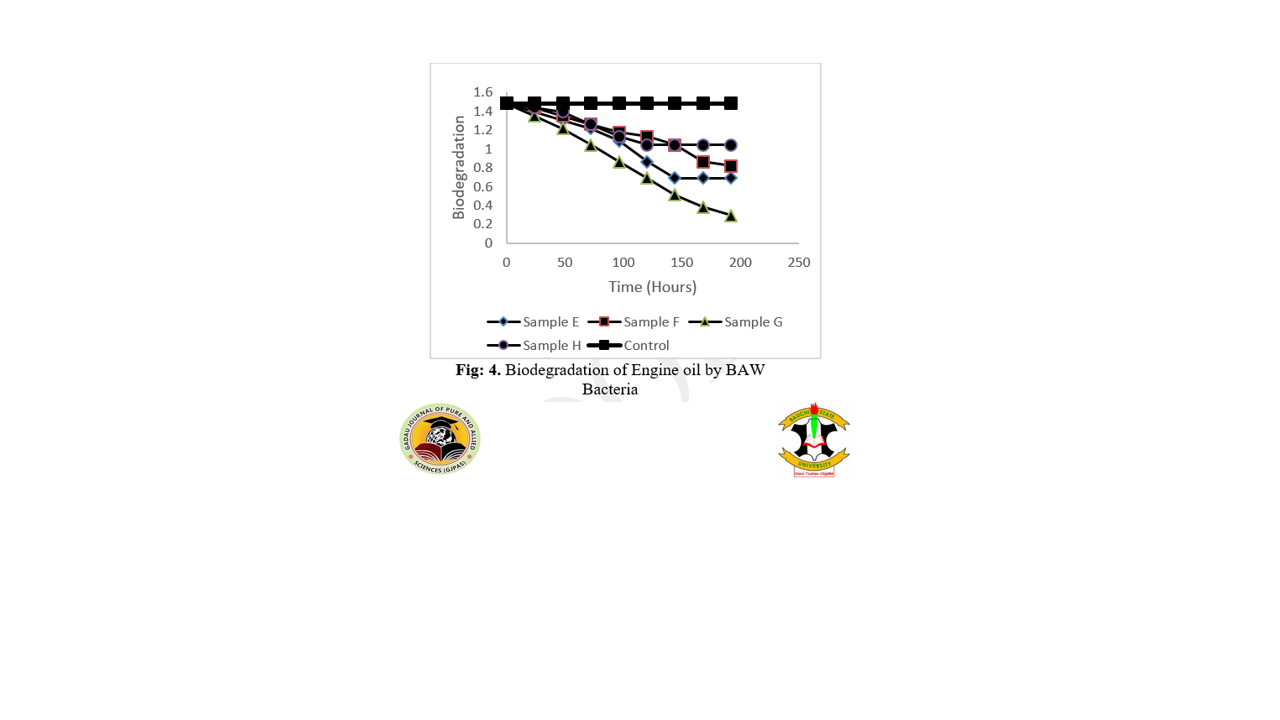Isolation, Screening and Biochemical Characterization of Used Engine Oil Degrading Bacillus Species and Pseudomonas Species
DOI:
https://doi.org/10.54117/gjpas.v3i1.145Abstract
Extensive demand of natural resources has resulted in several large-scale unintentional hydrocarbon oil spills and environmental catastrophes due to the rising demand for fossil fuel energy. These hydrocarbon pollutants have effect on environment and human health. Spectrophotometric and Biochemical Methods are used for the research. Soil sample were collected from two different contaminated areas and used engine oil, the bacteria were isolated and tested for evaluation of bacterial growth and biodegradation by enrichment technique using Bushnell Hass broth with used engine oil as sole carbon source. The results show that Pseudomonas specie were capable of degrading used engine oil which remove 80% of the oil and Bacillus specie which remove 65% of the used engine oil. This illustrates that hydrocarbon biodegrading bacteria can be used for remediation of hydrocarbon contaminated soil.
References
Adeleye, A. O., Nkereuwem, M. E., Omokhudu, G. I., Amoo, A. O., Shiaka, G. P., Yerima, M. B., 2018. Effect of microorganisms in the bioremediation of spent engine oil and petroleum related environmental pollution. Journal of Applied Sciences and Environmental Management 22, 157–167.
Ajiboye, A. E., Sulayman, H. O., Ajao, A. T., 2020. Bioremediation of spent engine oil on selected contaminated soils within Ilorin metropolis. Advanced Journal of Graduate Research 8, 91–104.
Eniola, K. I. T., Adegbola, G. M., Opasola, O. A., 2014. Biodegradation of used engine oil by bacteria isolated from soil contaminated with used engine oil in Ogbomoso, Nigeria. IOSR J. Environt. Sci. Toxic. Food Tech.(IOSR-JESTFT) 8, 66–70.
Farag, S., Soliman, N. A., Abdel-Fattah, Y. R., 2018. Statistical optimization of crude oil bio-degradation by a local marine bacterium isolate Pseudomonas sp. p48. Journal of Genetic Engineering and Biotechnology 16, 409–420.
Head, I. M., Jones, D. M., Röling, W. F., 2006. Marine Microorganisms make a meal of oil. Nature Reviews Microbiology 4, 173–182.
Karamba, K. I., Abdullahi, M. M., 2022. Optimization of traditional starter culture and African locust beans for daddawa production using Response Surface Methodology (RSM). Gadau Journal of Pure and Allied Sciences 1, 166–173.
Karamba, K. I., Ahmad, S. A., 2019. Mathematical Relationship of Optical Density, Total Viable Count and Microbial Biomass for Growth of Serratia marcescens Strain AQ07 on Cyanide. Journal of Environmental Microbiology and Toxicology 7, 7–9.
Karamba, K. I., Ahmad, S. A., Azham, Z., Syed, M.A., Khalil, K. A., Shamaan, N. A., Dahalan, F. A., Shukor, M. Y., 2016. Optimisation of biodegradation conditions for cyanide removal by Serratia marcescens strain AQ07 using one-factor-at-a-time technique and response surface methodology. Rendiconti Lincei 27, 1–13.
Karamba, K. I., Ahmad, S. A., Zulkharnain, A., Yasid, N. A., Ibrahim, S., Shukor, M.Y., 2018. Batch growth kinetic studies of locally isolated cyanide-degrading Serratia marcescens strain AQ07. 3 Biotech 8, 11.
Karamba, K. I., Shukor, M. Y., Syed, M. A., Zulkharnain, A., Adeela, N., Yasid, A. K., Khalil, K. A., Ahmad, S. A., 2015. Isolation, screening and characterisation of cyanide-degrading Serratia marcescens strain aq07. J. Chem. Pharm. Sci. 8, 401–406.
Kawo, A.H., Faggo, A.A., 2017. Enhanced removal of crude oil in soil by co-culture of Bacillus subtilis and Pseudomonas aeruginosa isolated from contaminated soil in Kano State, Nigeria. Bayero Journal of Pure and Applied Sciences 10, 423–427.
Kostakioti, M., Hadjifrangiskou, M., Hultgren, S.J., 2013. Bacterial biofilms: development, dispersal, and therapeutic strategies in the dawn of the postantibiotic era. Cold Spring Harbor perspectives in medicine 3.
Liu, B., Ju, M., Liu, J., Wu, W., Li, X., 2016. Isolation, Identification, and crude oil degradation characteristics of a high-temperature, hydrocarbon-degrading strain. Marine pollution bulletin 106, 301–307.
Lovett, G.M., Tear, T.H., Evers, D.C., Findlay, S.E.G., Cosby, B.J., Dunscomb, J.K., Driscoll, C.T., Weathers, K.C., 2009. Effects of Air Pollution on Ecosystems and Biological Diversity in the Eastern United States. Annals of the New York Academy of Sciences 1162, 99–135.
Maarof, M. Z., Shukor, M. Y., Othman, M., Karamba, K.I., Halmi, M.I.E., Rahman, M.F., Yakasai, H.M., 2018. Isolation and Characterization of a Molybdenum-reducing Bacillus amyloliquefaciens strain KIK-12 in Soils from Nigeria with the Ability to Grow on SDS. J Environ Microbial Toxicol 6, 13–20.
Musa, S. I., 2019. Isolation and identification of diesel Oil-degrading bacteria in used engine oil contaminated soil. Journal of Applied Sciences and Environmental Management 23, 431–435.
Obayori, O. S., Adebusoye, S. A., Adewale, A. O., Oyetibo, G. O., Oluyemi, O. O., Amokun, R.A., Ilori, M.O., 2009. Differential degradation of crude oil (Bonny Light) by four Pseudomonas strains. Journal of Environmental Sciences 21, 243–248.
Shahriari Moghadam, M., Ebrahimipour, G., Abtahi, B., Ghassempour, A., Hashtroudi, M. S., 2014. Biodegradation of polycyclic aromatic hydrocarbons by a bacterial consortium enriched from mangrove sediments. J Environ Health Sci Engineer 12, 114.
Tirmizhi, M., Faggo, A. A., Gulumbe, B. H., 2022. Species of Pseudomonas and Bacillus Isolated from Refined Oil-contaminated Soil Showed the Potential to Efficiently Degrade Diesel. J Biochem Microbiol Biotechnol 10, 72–5.
Udeani, T. K. C., Obroh, A. A., Okwuosa, C. N., Achukwu, P. U., Azubike, N., 2009. Isolation of bacteria from mechanic workshops’ soil environment contaminated with used engine oil. African journal of Biotechnology 8.
Valentin, L., Feijoo, G., Moreira, M. T., Lema, J. M., 2006. Biodegradation of polycyclic aromatic hydrocarbons in forest and salt marsh soils by white-rot fungi. International Biodeterioration & Biodegradation 58, 15–21.

Downloads
Published
Issue
Section
License
Copyright (c) 2024 Gadau Journal of Pure and Allied Sciences

This work is licensed under a Creative Commons Attribution 4.0 International License.

